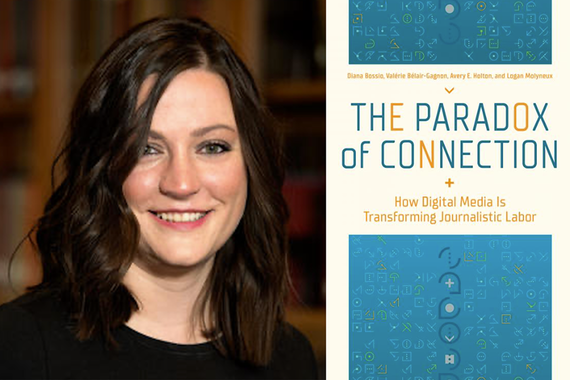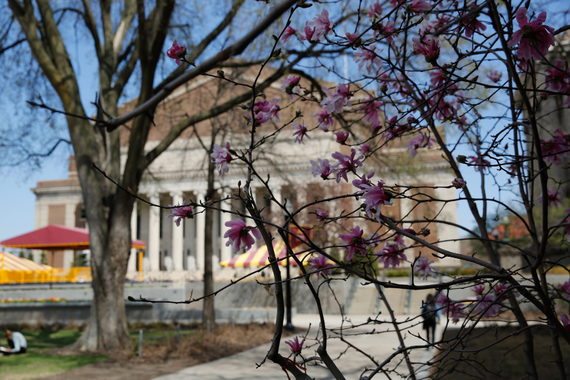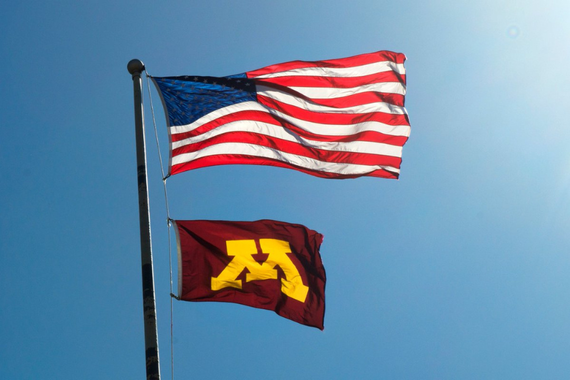Spring Course Offerings That Engage with Middle Eastern Politics, History & Culture
This list contains spring 2025 courses from across our liberal arts disciplines that engage deeply with the Middle East, each touching on issues related to the ongoing violence in Gaza and Israel. Follow the links to learn more and to consider adding these courses to your schedule.
Modern Middle Eastern Cultures & Societies
What we commonly and monolithically refer to as “the Middle East” in fact consists of many different individual nation-states, each with their own particular historical trajectory and a combined population of half a billion people encompassing a plethora of religious faiths, political orientations, social formations, and varied identities. This course provides a starting point for comprehending this frequently misunderstood part of the world, the diverse peoples who inhabit it, and the myriad cultures they practice. We will address the various problems we encounter when approaching such an unwieldy concept as “the Middle East,” key moments that have shaped modern Middle Eastern cultures and societies, and examples of how cultural production functions in the context of modern Middle Eastern history and politics.
Fulfills Arts/Humanities; Global Perspectives
Islamic Mysticism & Modernism
This course offers an introduction to the tradition of Islamic mysticism, or Sufism. It aims to first develop an understanding of the mystical perspectives within Islam that have influenced most of the world’s Muslim population, and then to understand how that tradition has changed under the conditions of modernity. Throughout Islamic history, Sufis (Islamic mystics) developed fascinating philosophical theories and beautiful literature, attempting to answer questions about the meaning of life and the nature of reality. We will read Islamic mystical texts that explore everything from hidden meanings of the Qur’an, to dreams and supernatural powers, to sex, love, and spiritual connection with God, written by mystics from Africa to the Middle East to China and beyond. We will also examine what happens to Sufism in the modern period, given challenges from colonialism as well as alternate schools of thought within Islam, and consider the writings of the Sufis’ opponents: Salafis, socialists, secularists, and other modernizers.
Fulfills Arts/Humanities; Global Perspectives
Orientalism & the Arab World
This course explores the various manners in which “the Arab World” is constructed and re/presented in American and European discourses. Reading through scholarly writings, literature, visual arts, and popular media, this course illuminates the manner in which the idea of a monolithic “Arab World” and quintessential “Arab” subject are constructed and re/produced for Western consumption. Crucially, this course also examines the manner in which this re/production of the “Arab World/Subject” is integral to the construction of Western identity itself—serving as a foil to Western self-conceptualization.
The concept of Orientalism was introduced into Western scholarship by Edward Said through his seminal 1978 work, Orientalism, often credited as a foundational text in the field of postcolonial studies. In the first part of the course, we will closely read Orientalism and some of the influential critical engagements with Said’s book. We will also discuss how orientalist discourse has been subsumed under the debates on the “Clash of Civilizations” and “The War on Terror” in the 21st century. The second part of the course will look at orientalist representations in a variety of mediums, from literature and visual art to video games. In the final part of the course, we will try to “inventory the traces” of Orientalism on the Oriental subject, or examine the manner Arab artists and writers have engaged with Orientalism’s legacies.
Fulfills Arts/Humanities; Diversity & Social Justice in the US
Arab Prison Writing
From colonial-era prisons to post-colonial regimes' widespread use of detention to neocolonial spaces of confinement such as Guantanamo and Abu Ghraib, incarceration and its threat have been prominent features of modern Arab life spawning a distinct genre: prison writing. This course surveys novels and memoirs of this genre to examine the various forms imprisonment and incarceration take in Arab literature and the often surprising ways in which they are represented.
The Bible: Context & Interpretation, World of the New Testament
Religious or not, Christian or not, hundreds of millions of people around the world utilize the New Testament for everything from personal belief (“Jesus is my personal Lord and Savior”) to mass entertainment (documentaries, art house films, and blockbusters); from religious gatherings (most forms of Christianity) to “secular” spiritual teachings (“Turn the other cheek”); from fine art (Salvador Dali’s “Christ of Saint John of the Cross”) to matters of law (Good Samaritan laws); and from politics (Christian nationalism) to literature (the quotes Harry Potter finds on the gravestones in Godric’s Hollow). The New Testament deeply influences modern cultural contexts all around the world, but especially in the Western world. This course will explore the New Testament from a different context, that of its first-century birthplace. We will build students’ understanding of the writings of the New Testament in the Roman Empire of the first century by gaining basic cultural knowledge of first-century Greece, Rome, and Israel/Palestine and then reading the Gospels, the letters of Paul, and the Book of Revelation from the perspective of these intersecting worlds. The New Testament is grounded in this context, and deeper exploration of New Testament writings from a first-century perspective will help students enrich their understanding of modern references like the ones mentioned above.
Fulfills Arts/Humanities
Roman Art & Archaeology
The visual culture of the ancient world offers insight into the elite levels of ancient Rome's population, while archaeological evidence sheds light on the everyday people who helped build this powerful civilization. Combined, these aspects provide a comprehensive portrait of Roman culture and the societies it dominated throughout history. From formation of the city-state of Rome under Etruscan domination, to the transformation of visual and material culture in late antiquity under peoples influenced by the Romans, especially those in the eastern Roman provinces of Syria, Judea, and Arabia. No prior knowledge is required, making this an exciting introduction to the rich intersection of art history, archaeology, and the classical world. Through hands-on methodologies, you will learn to think like a historian, meaningfully incorporating visual, material, and textual evidence into your writing. Dive into the material legacy of Rome and gain a deeper understanding of its lasting influence.
Fulfills Historical Perspectives
Multiculturalism in Modern Israel: How Communities, Ideologies & Identities Intersect
This course focuses on the way various cultural groups in Israel attempt to achieve cultural recognition. Students will learn how various ethnic and religious groups shape their identities through process of acculturation and struggle. Students will learn about several Israeli cultures by reading literature, book chapters, and case-studies, and watching movies, all of which center on these debates.
Students will examine various case studies centered on these multicultural issues in Israel and will discuss and reflect on the implications of the issues raised by the course material for the international community, the United States, and for their own lives.
Socialist Realism & Peripheral Modernism
Seminar in post-colonial literature, culture, and theory.
More Than Human Rights
“More than human rights” has a double meaning. One, it refers to a wide range of rights beyond political and civil rights (e.g., housing, education, food) that humans need in order to have a dignified life. Two, it also refers to the rights of more-than-human beings, including spirits, animals, mountains, rivers, trees, plants, and the like, without which human form of life is not possible. As a way of developing a more expansive understanding of rights and justice, this course concentrates on intersectional methodologies, transnational epistemologies, and non-Western ontologies. By doing so, it aims to address socio-economic, environmental, territorial, racial, gender-based, and sexual injustices in the contemporary global world. The main question that organizes the readings assigned for this course is: What would emancipatory political movements look like once we move beyond human- and state-centric approaches to rights? This course troubles human- and state-centered analysis of rights by examining the dialectical relationship between multi-scalar and multifaceted capitalist power structures and emancipatory political movements. Drawing on readings from abolition feminism, post-colonial, Indigenous, and literary studies, the course helps students explore alternative trajectories that the rights language assumes as it is employed and expanded by a wide range of political communities. The cases studied in this course include (but not limited to) the sovereignty rights of Indigenous Nations in North America, the Palestinian refugees’ right of return, the Kurdish liberation movement in the Middle East, the minority rights of Uyghurs in China, and the abolition politics of radical Black feminists in the US.
Martyrs, Monks, Crusaders: World Christianity
This course surveys the history of Christianity from its status as a persecuted minority religion of the Roman Empire to its dominant role in medieval Europe and Byzantium. We study Christian traditions in Asia and Africa, as well as Europe with special attention to the relationship between Christianity and culture in the ancient and medieval world.
Fulfills Global Perspectives; Historical Perspectives; Writing Intensive
History of Modern Israel/Palestine: Society, Culture & Politics
History of Israel/Palestine, 19th–21st centuries. Zionism and Arab nationalism. Arab/Palestinian/Israeli wars. Ethnic, religious, and national identities. Israeli and Palestinian politics, culture, and society; conflicting narratives and shared histories.
Fulfills Global Perspectives
Islam Religion & Culture
This course is a brief survey of the religion and civilization of Islam. It introduces students to
- Islamic history from its inception in the seventh century CE to the present, with emphasis on the life of the Prophet Muhammad and the early Caliphate.
- The authoritative texts of Islam, i.e., the Quran and Prophetic traditions (Hadith).
- The institutions and discourses characteristic of Islamic civilization.
- The transformation of Muslim life and thought in the modern period.
By taking this course, students become familiar with the chief ideas, characters, narratives, rites, localities, and movements associated with Islam.
Christ in Islamic Thought
Examines the history of the figure of Christ in Islamic thought, from the beginnings of Islam in the Qur'an and the Hadith to the 2013 book by Reza Aslan, Zealot. The course is based on close reading of primary sources from regions extending from Spain to Iran, and in various languages (in translation): Arabic, Greek, French, Farsi, and Italian. Demonstrates how much the interpretation of the figure of Christ in Islamic thought belonged to specific historical contexts.
Fulfills Writing Intensive
Global Jerusalem: Jews, Christians & Muslims in the Contested City, Ancient to Modern Times
The capstone research course helps students prepare and complete their writing-intensive research paper that satisfies the capstone requirement of the history major. Class readings and exercises help students define a research question that fits within the thematic frame of the course, conceptualize the project, identify and analyze primary sources, craft a paper outline, revise drafts, and produce a final version of the Major Paper in History. Topics in 4011W/V will vary by semester and will be printed in the class schedule.
This capstone research course focuses on how the city of Jerusalem was formed by the three major religions: Judaism, Christianity, and Islam. Jerusalem has been considered sacred by millions of people who do not live there but who feel they have much at stake in the control of the city. This has been a major influence on the global history of Jerusalem and on the daily lives of its residents. Continuously inhabited for more than three thousand years, its long and unique history of conflict and coexistence constantly shapes its history, from the many conquests of the past to the contemporary contest between Israelis and Palestinians. Students will choose a topic of research in this long history, analyzing different and often opposing viewpoints on Jerusalem in the writings of scholars, travelers, residents, and religious and political leaders.
Fulfills Writing Intensive
Islamist Politics
The relationship between Islam and politics—both in the Muslim world and in the West—is one of the most important political issues of our day. This class will address these issues by taking a historical and political look at the development of Islam (the religion) and Islamism (Islamic political movements) in many areas of the Muslim world. We will begin by discussing the Islamic faith and historical debates about its relationship to politics. Then we will turn to the twentieth century, and examine the rise of Islamist politics in the Middle East and North Africa (e.g., Saudi Arabia, Egypt, Iran, Sudan) and South Central Asia (e.g., Pakistan, Afghanistan). We will study the successes and failures of Islamist revolutions. Then we will focus on the evolution of the "Arab Spring" and its implications for both Islamism and democracy. In doing so, we will discuss debates about the compatibility of Islam and democracy, and examine attempts at democracy in the Muslim World (e.g., Tunisia). We will examine the revival of Islam and rise of post-Soviet Islamism in Eurasia (Central Asia, Russia, and the Caucasus) during the last two to three decades. We will examine the effects of state repression of Islam and religious freedom in those countries. We will also discuss varying ideas about jihad, and the rise of global jihadists and terrorist groups, such as Al Qaeda and ISIS. We will study the jihads waged by Al Qaeda, the Taliban, and ISIS, and the implications of militancy and terrorism for establishing stability and democracy in the Muslim world.
We will read both Muslim and non-Muslim, American and non-American perspectives on these problems. Understanding these issues is critical to gaining perspective on the troubling state of today's complex global politics, and US foreign policy in Afghanistan, Iraq, Syria, and elsewhere.
Introduction to the Religions of the World
Introduction to major religions of world/academic study of religion. Hinduism, Buddhism, Judaism, Christianity, Islam, some pre-Christian religions of Antiquity.
Fulfills Global Perspectives
World Population Problems
This class is an introduction to the contemporary issues that accompany such dramatic population change, including fertility change, disease experiences, migration as opportunity and challenge and human-environment conflict. Further, we will examine the roles of global organizations, national governments, and culture in shaping and reshaping populations.
Fulfills Global Perspectives


